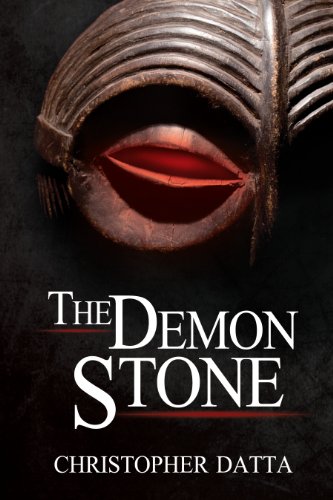Helping the reader sympathize with a character. #interview with Christopher Datta.
By tweeting this post, you can earn promotional tweets from me as part of the Amazon Tweet Exchange.
Details here.
Details here.

We're pleased to introduce
Christopher Datta
Author of
The Demon Stone

Cover links to Amazon.com
Lightening Round
Which writer are you most envious of?
Mark Twain
Compost or fertiliser
Compost
A day at the beach or an hour at a bookstore?
A day at the beach with a book.
Mark Twain
Compost or fertiliser
Compost
A day at the beach or an hour at a bookstore?
A day at the beach with a book.
Serious Round
Do you base any characters on real-life people that you know?
Many of the characters in my novel The Demon Stone are based on real people I have known. General Mosquito, for instance. Gem and Hampton, the two dogs in the story, are dogs I have known and loved very much.
Basically, I took experiences and people from my life in America and in Africa, put them in an environment of my creation, and let them weave the story together. My books never turn out the way I think they will at the beginning of writing them. The characters at some point take over and they tell the story. Sometimes, in my experience, all a good writer has to do is listen carefully to what the people he creates are telling him.
That certainly happened in Demon Stone. But that shouldn’t be surprising. If you are really on a spiritual journey in telling a story, and you do a good job of it, you should expect to wind up in unexpected places.
Do you try to make you antagonists likeable?
The toughest character to write in my novel The Demon Stone was Morgan. She is one of the main antagonists of the book, but I didn’t want her to be a caricature and there was a real risk of her being a two dimensional archetype instead of a real flesh and blood person. On some level, for an antagonist to work well in a story, the reader needs to identify or on some level sympathize with that person. Morgan does terrible things, but terrible things have happened to her. I hope that comes across in the story.
Many of the characters in my novel The Demon Stone are based on real people I have known. General Mosquito, for instance. Gem and Hampton, the two dogs in the story, are dogs I have known and loved very much.
Basically, I took experiences and people from my life in America and in Africa, put them in an environment of my creation, and let them weave the story together. My books never turn out the way I think they will at the beginning of writing them. The characters at some point take over and they tell the story. Sometimes, in my experience, all a good writer has to do is listen carefully to what the people he creates are telling him.
That certainly happened in Demon Stone. But that shouldn’t be surprising. If you are really on a spiritual journey in telling a story, and you do a good job of it, you should expect to wind up in unexpected places.
Do you try to make you antagonists likeable?
The toughest character to write in my novel The Demon Stone was Morgan. She is one of the main antagonists of the book, but I didn’t want her to be a caricature and there was a real risk of her being a two dimensional archetype instead of a real flesh and blood person. On some level, for an antagonist to work well in a story, the reader needs to identify or on some level sympathize with that person. Morgan does terrible things, but terrible things have happened to her. I hope that comes across in the story.
Wacky Question
What's the strangest place you've found inspiration?
My career as an American diplomat took me to many places in Africa. The original inspiration for the book The Demon Stone occurred when I was traveling through rural Uganda. I came across a hut with a hand painted sign advertising the services of a local shaman. Intrigued, I stopped and met the old man, who offered to cast a curse on any enemies I wanted eliminated.
That got me thinking about what it would be like to have that kind of power, and what the unintended consequences of using it might be. The record of the human use of unbridled power is not very good. In my travels through many war zones I have seen incredible beauty and sacrifice as well as the most horrible and brutal acts of cruelty.
My career as an American diplomat took me to many places in Africa. The original inspiration for the book The Demon Stone occurred when I was traveling through rural Uganda. I came across a hut with a hand painted sign advertising the services of a local shaman. Intrigued, I stopped and met the old man, who offered to cast a curse on any enemies I wanted eliminated.
That got me thinking about what it would be like to have that kind of power, and what the unintended consequences of using it might be. The record of the human use of unbridled power is not very good. In my travels through many war zones I have seen incredible beauty and sacrifice as well as the most horrible and brutal acts of cruelty.
Author Bio

